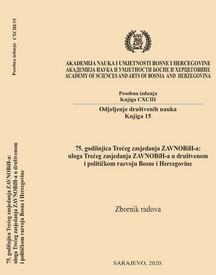ZAVNOBIH: POLITIČKA IMAGINACIJA PRAVEDNOG RATA
ZAVNOBIH: THE POLITICAL IMAGINATION OF THE JUST WAR
Author(s): Nerzuk Ćurak
Subject(s): Political history, Government/Political systems, Political behavior, Nationalism Studies, WW II and following years (1940 - 1949), Inter-Ethnic Relations, Geopolitics, Peace and Conflict Studies
Published by: Akademija Nauka i Umjetnosti Bosne i Hercegovine
Keywords: ZAVNOBiH; absolute event; theory; ideology; just war; post-Dayton state; nationalism; idealism; realism;
Summary/Abstract: The transcripts from Sarajevan State Anti-fascist Council for the National Liberation of Bosnia and Herzegovina session witness the dedication of its councilors towards the present. This implicates an intense connection of Bosnia and Herzegovina with the Yugoslavian geopolitical imaginary (B&H as a homeland within a homeland). At the same time, it develops a discourse – an indisputable one – of a unified Bosnia as a political community being built as a state. The third ZAVNOBiH session, unfortunately, did not develop enough strength to deepen and pull the true levers of the state citizenship imagined within the earlier grand freedom charter from Sanski Most. However, the epochal success of the Sarajevo session lies in its development of a territorial identity of Bosnia and Herzegovina as a socially, economically and culturally conscious space. This success is an epochal success – especially when compared with B&H’s current arrested development. Today, this country is left without its unified space, reduced to a mere territorial sum. It is also deprived of its unique trinational togetherness, reduced to a nationalistic negation of the ZAVNOBIH itself, a translation of the “3 in 1” formula into a “big, acephalous nothing”. The fact that the third ZAVNOBIH session was held in Sarajevo witnesses the building of Bosnia from the state of war to the state of peace as a political community – from the periphery of a just war (Bosnian Krajina) towards the center (Sarajevo), which used to be an extremely important symbolic and political message about its core state community. This community grew as a natural, decentralized entity, but with a clear, leading, all encompassing topos from a place (that is not Belgrade, nor Zagreb) where its unique plural identity is forged. Our only option is to proceed with forging.
- Page Range: 15-29
- Page Count: 15
- Publication Year: 2020
- Language: Bosnian, Croatian, Serbian
- Content File-PDF

